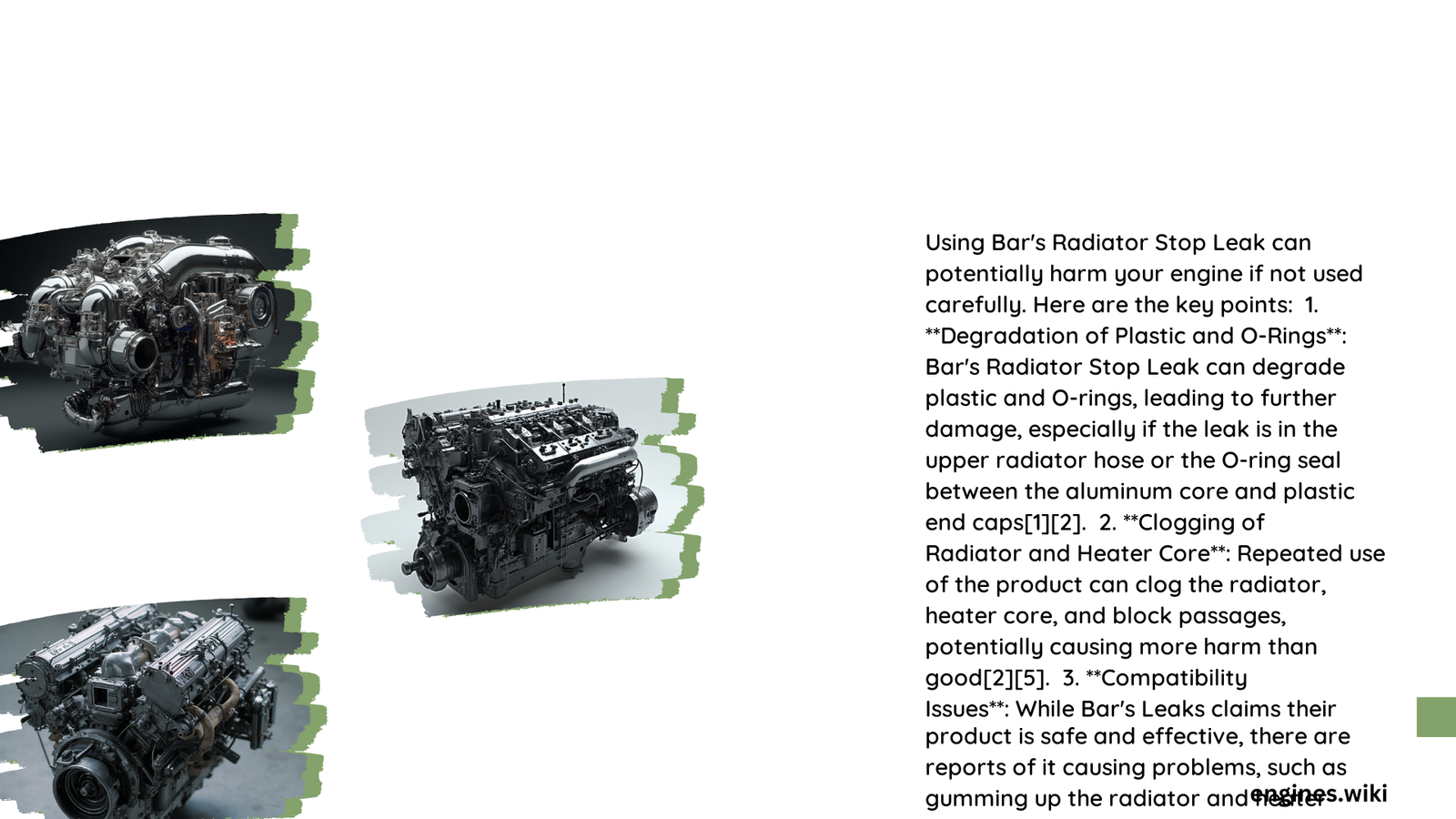Bar’s Radiator Stop Leak products are designed to seal minor leaks in vehicle cooling systems. While they can be effective for temporary repairs, there are potential risks to consider. The chemical composition of these products can interact with engine materials, potentially causing clogs or corrosion if not used properly. Effectiveness varies based on the type and severity of the leak. Proper application and system maintenance are crucial to minimize risks and ensure optimal performance.
What Are the Key Components of Bar’s Radiator Stop Leak Products?
Bar’s Radiator Stop Leak products contain various chemical components, depending on the specific formulation:
- Radiator Stop Leak 2X Concentrate Sealer:
- Deionized water
- Organic material
- Soda ash
- Ethylene glycol
- Potassium hydroxide
-
Various chloride compounds
-
Liquid Aluminum Radiator Stop Leak:
- Liquid Aluminum™
-
Xtreme Cool™
-
Copper Stop Leak and Head Gasket Repair:
- Copper dust, mist, and flake
- Sodium silicate
These components work together to create seals in small leaks by polymerizing or forming physical plugs.
How Do These Chemicals Interact with Engine Materials?

The interaction between Bar’s Radiator Stop Leak chemicals and engine materials can be complex:
- Aluminum Reactions: Liquid Aluminum™ can react with metal surfaces to form seals.
- pH Balancing: Soda ash and sodium bicarbonate help neutralize pH imbalances.
- Glass-like Seals: Sodium silicate forms a glass-like seal when in contact with coolant and leak areas.
However, these interactions can also lead to potential issues:
- Corrosion of certain engine components
- Formation of brittle seals
- Clogging of narrow passages in the cooling system
What Is the Effectiveness of Bar’s Radiator Stop Leak?
The effectiveness of Bar’s Radiator Stop Leak products can vary:
| Scenario | Effectiveness |
|---|---|
| Minor leaks | Generally effective |
| Heavily clogged radiators | Less effective |
| Properly maintained systems | Higher success rate |
User experiences suggest that the product can be successful when used correctly, especially for small leaks. However, there’s no comprehensive empirical data on success rates.
What Are the Risks Associated with Using Bar’s Leak Products?
Using Bar’s Radiator Stop Leak products comes with several potential risks:
- Clogging of Cooling System Passages:
- Can reduce coolant flow
-
May lead to overheating issues
-
Incompatibility with Antifreeze:
- Some products require flushing of all coolant before use
-
Mixing with antifreeze can cause gelling and system clogs
-
Corrosive Effects:
- Chemicals may corrode or damage cooling system components
- Sodium silicate can make parts brittle
How Can I Minimize Risks When Using Bar’s Radiator Stop Leak?
To minimize risks and ensure effectiveness when using Bar’s Radiator Stop Leak:
- Follow Dosage Instructions:
- Use the correct amount as specified on the product label
-
Allow proper circulation time
-
Consider Environmental Conditions:
- Ensure safe cooling system temperature before application
-
Avoid extreme hot or cold conditions
-
Proper System Maintenance:
- Flush the cooling system before and after use
- Use a cleaner to remove any residue
- Allow the system to air dry if necessary
What Are the Long-term Effects on Engine Performance?
The long-term effects of using Bar’s Radiator Stop Leak on engine performance can include:
- Reduced Cooling Efficiency:
-
If passages become clogged, heat transfer may be impaired
-
Potential for Future Leaks:
-
Temporary seals may deteriorate over time
-
Corrosion of Components:
-
Chemical interactions may weaken certain parts
-
Difficulty in Future Repairs:
- Residue can complicate future maintenance or repairs
When Should I Use Bar’s Radiator Stop Leak vs. Professional Repair?
Consider these factors when deciding between Bar’s Radiator Stop Leak and professional repair:
- Use Bar’s Radiator Stop Leak when:
- The leak is minor
- You need a temporary fix
-
Professional repair is not immediately available
-
Opt for Professional Repair when:
- The leak is severe
- You’ve used stop leak products multiple times
- There are signs of major cooling system issues
What Are the Alternatives to Bar’s Radiator Stop Leak?
Consider these alternatives to Bar’s Radiator Stop Leak:
- Professional Radiator Repair:
- More permanent solution
-
Addresses underlying issues
-
Radiator Replacement:
- Ensures optimal cooling system performance
-
Eliminates risk of future leaks
-
Other Stop Leak Brands:
- K-Seal
- BlueDevil
-
ATP AT-205
-
DIY Repair Methods:
- Epoxy for small external leaks
- Radiator sealant tape for temporary fixes
Always weigh the pros and cons of each option based on your specific situation and the severity of the leak.
References:
1. Home Machinist Forum Discussion
2. Consumer Product Information Database (CPID)
3. Bar’s Leaks Official Website
